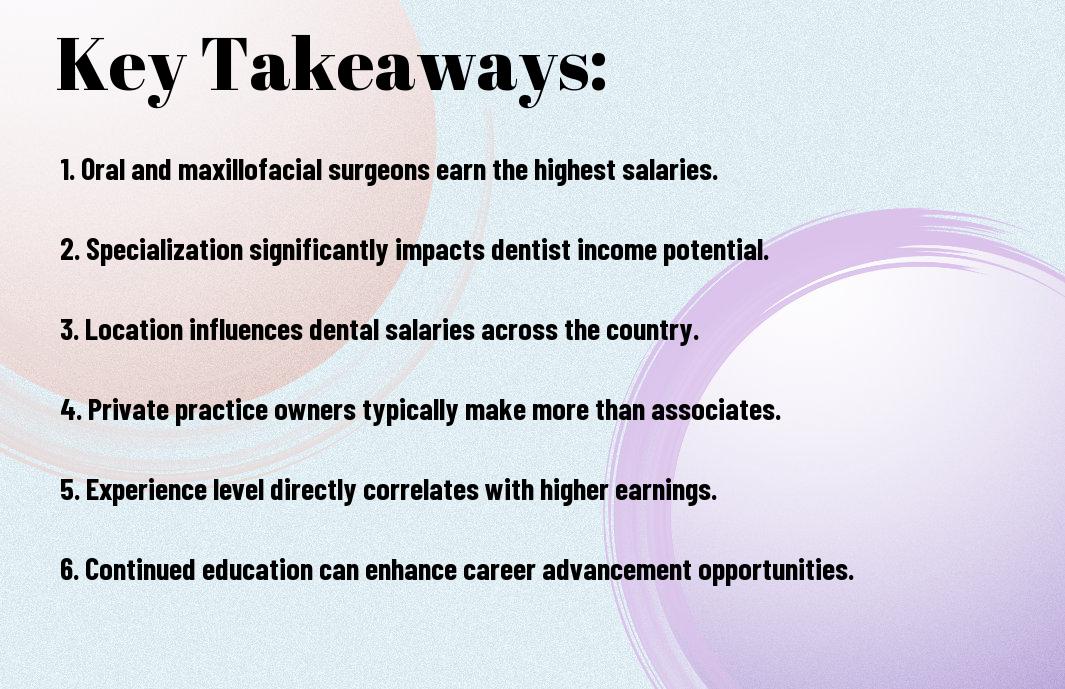Salary varies widely among dental professions, and understanding which dentist job pays the most can help you navigate your career path effectively. Whether you are considering dental school or are already practicing, knowing the earning potential of different roles can influence your decisions. In this post, you will discover the highest-paying dental careers, along with the factors that contribute to their salaries. Prepare to explore valuable insights that can help you maximize your earning potential in the field of dentistry.
Key Takeaways:
- Specialization: Dentists specializing in fields like oral surgery, orthodontics, and prosthodontics typically earn higher salaries than general dentists.
- Geographic Location: Salaries can vary significantly based on location, with urban areas or regions with a high demand for dental services usually offering higher pay.
- Experience Level: More experienced dentists tend to earn more, as they often have established patient bases and advanced skills.
- Type of Practice: Ownership of private practices or partnerships often yields higher income compared to salaried positions in clinics or hospitals.
- Work Setting: Positions in hospitals or research institutions may offer unique compensation packages that can lead to higher earnings compared to traditional dental practices.

Overview of Dental Professions
While exploring various careers in dentistry, it’s important to understand the different roles that contribute to the field’s overall success. From general practitioners to specialized professionals, there are numerous options available for aspiring dentists. For insights into lucrative opportunities, you can check out the 10 Highest Paying Dentist Jobs to Consider (no Med …. Each position has its unique responsibilities and earning potential, shaping the landscape of modern dental care.
General Dentist
General dentists provide comprehensive dental care for patients of all ages, focusing on preventive services, restorative treatments, and education about oral hygiene. They perform routine exams, fillings, crowns, and tooth extractions, ensuring a foundation for your overall oral health. As a general dentist, you play a vital role in addressing a wide range of dental issues while also managing patient relationships effectively.
Specialty Dentists
Any dentist looking to maximize earning potential may consider specializing in a particular area of dentistry. Specialty dentists, such as orthodontists, oral surgeons, and periodontists, often require additional education and training, but they can enjoy significantly higher salaries due to their advanced skills and expertise.
Overview of specialty dentists reveals that they focus on specific areas within dental care, allowing you to choose a path that aligns with your interests and skills. For example, orthodontists concentrate on aligning teeth and jaws, while oral surgeons handle complex surgical procedures. By pursuing one of these specialized paths, you can increase your earning potential and enhance your professional satisfaction in the dental field.
Factors Influencing Dentist Salaries
Assuming you are considering a career in dentistry, it’s important to understand the various factors that influence dentist salaries. Key elements include:
- Location of practice
- Level of education and specialized training
- Your years of experience in the field
- Type of dental practice (private, group, or corporate)
- Market demand for dental services in your area
The combination of these factors will significantly impact your earning potential as a dentist.
Location
Across the country, dentist salaries can vary substantially based on geographic location. Urban areas typically offer higher salaries due to the increased demand for dental services and the higher cost of living. Conversely, rural locations may offer lower salaries, but the cost of living is often more affordable. It’s crucial to research the specific regions and cities where you plan to work to gauge potential earnings accurately.
Experience and Education
Experience in dentistry plays a significant role in determining your salary. The more years you have worked, the more expertise you acquire, leading to higher pay. Your educational background also impacts your earning potential. Advanced degrees and specialized training often result in better job opportunities and increased income. Continuing education can further enhance your skills, leading to greater responsibility and higher compensation.
Location is a fundamental element in the salaries of dentists. Practices situated in metropolitan areas tend to pay more, reflecting the competitive landscape and higher living expenses. However, if you find yourself in a less populated region, keep in mind that your lifestyle might be more affordable, balancing the lower wages. Ultimately, analyzing both salary and cost of living in various locations will help you make informed decisions for your career path in dentistry.
Highest Paying Dental Specialties
All dental specialties vary in compensation, but some stand out due to the complexity and expertise required. If you’re considering a career in dentistry, understanding these high-paying roles can guide you toward the most lucrative opportunities. Specialties such as oral and maxillofacial surgery and orthodontics frequently offer the highest salaries, reflected in their advanced training requirements and the demand for their services.
Oral and Maxillofacial Surgeons
With a focus on complex surgical procedures, oral and maxillofacial surgeons command some of the highest salaries in the dental field. These specialists are trained to perform surgeries involving the mouth, jaws, and face, which often require extensive education and residency training. As a result, their skills are highly sought after, leading to significant earning potential.
Orthodontists
One of the top-earning dental specialties is orthodontics, which focuses on diagnosing, preventing, and correcting teeth and jaw alignment issues. Orthodontists utilize braces, retainers, and other appliances to help patients achieve proper function and aesthetics, contributing to their high income levels.
Further, orthodontists typically complete an additional 2-3 years of specialized residency training after dental school, equipping them with the knowledge and skills to manage complex orthodontic cases. Their expertise not only improves patients’ smiles but also enhances their overall oral health, resulting in significant demand for their services. If you aspire to a high-paying dental career, orthodontics could be a rewarding path for you.

Comparing Salaries Across Dental Jobs
Keep in mind that salaries for dental jobs can vary significantly based on factors such as location, experience, and type of practice. Below is a breakdown of average annual salaries for various dental professions.
Average Dental Job Salaries
| Dental Job Title | Average Salary |
|---|---|
| General Dentist | $160,000 |
| Orthodontist | $228,000 |
| Pediatric Dentist | $215,000 |
| Oral Surgeon | $250,000 |
| Periodontist | $220,000 |
General Dentistry vs. Specialty Dentistry
The salary difference between general dentistry and specialty dentistry can be quite significant. While general dentists typically earn around $160,000 annually, specialists like orthodontists and oral surgeons often earn more, reflecting the additional training and expertise required.
Private Practice vs. Employed Dentists
On the other hand, the work setting can also impact your earnings. Private practice dentists may have higher earning potentials compared to employed dentists. However, employed positions often come with benefits that can offset the variance in salary.
With private practice, you have the potential to earn a larger income as you are in control of setting your fees and determining how many patients you see. However, you may also face higher overhead costs and the pressure of managing a business. In contrast, employed dentists benefit from a steady paycheck and benefits like health insurance and retirement plans, which can provide financial stability while sacrificing some income potential.
Job Market Trends for Dentists
For those considering a career in dentistry, the job market is evolving rapidly, influenced by technological advancements and changing patient needs. As more people prioritize oral health, the demand for dental services is steadily increasing, creating numerous opportunities for aspiring and established dentists alike. Understanding these trends can help you make informed career choices that align with your financial goals and professional aspirations.
Demand for Dental Services
Any dentist looking to expand their practice will benefit from the growing demand for dental services. As awareness of oral health’s importance increases, more patients seek regular check-ups and treatments. This upsurge drives job stability and potential earnings for dental professionals, positioning you advantageously in a competitive market.
Evolution of Specialty Fields
Along with the rising demand for dental services, the evolution of specialty fields within dentistry is transforming career paths. New specializations are emerging in response to advancements in technology and a deeper understanding of oral health issues, allowing you to tailor your practice to specific interests and market needs.
Specialty fields like cosmetic dentistry, pediatric dentistry, and oral surgery are gaining traction, enabling you to focus on an area that resonates with your passion and expertise. These evolving fields often come with higher earning potential and increased job satisfaction, as they allow you to offer specialized care that meets diverse patient needs. Exploring avenues in these specialties may not only enhance your professional growth but also significantly impact your earning potential as a dentist.
Choosing a Dental Career Path
Despite the various options available within the dental field, selecting the right career path requires careful consideration. Each role, from general dentists to specialists like orthodontists and oral surgeons, comes with its own unique responsibilities and required skill sets. Assessing your interests, desired work-life balance, and income potential will help you make an informed decision that aligns with your professional aspirations.
Educational Requirements
Career paths in dentistry generally begin with a bachelor’s degree, followed by a dental degree from an accredited dental school. Depending on the specialization you choose, additional training or residency programs may be necessary. Licensure is also required to practice, which often involves passing examinations to validate your competency in the field.
Personal Considerations
Requirements for success in a dental career extend beyond education and licenses. You must also evaluate your personal strengths and preferences, such as your communication skills and ability to work with diverse patient populations. Additionally, consider the physical demands of being a dentist, as well as the emotional resilience needed to manage challenging situations.
Further, understanding your work environment preferences, such as working independently in a private practice or collaborating in a group setting, will guide your decision. Additionally, think about your long-term career goals, including potential for advancement and specialization. Finding a balance between personal satisfaction and professional achievement is important as you navigate your dental career path.
Conclusion
Summing up, if you’re considering a career in dentistry and want to maximize your earning potential, exploring specialized roles such as oral and maxillofacial surgeons, orthodontists, or prosthodontists may be beneficial. These positions not only demand advanced training but also offer significantly higher salaries. For more detailed insights, you can refer to the Highest Paying jobs in Dentistry. Your commitment to advancing your skills could lead to a highly rewarding financial future in this field.
Q: Which type of dentist earns the highest salary?
A: Generally, oral and maxillofacial surgeons tend to have the highest salaries among dental professionals. Their role involves performing surgical procedures on the mouth, jaw, and face, which requires extensive education and training. Additionally, they often handle complex cases that contribute to their higher earning potential.
Q: How does geographic location affect dentist salaries?
A: Geographic location plays a significant role in determining dentist salaries. Areas with a high demand for dental services and a low supply of dentists typically offer higher compensation. Urban settings or affluent regions often provide higher salaries to attract qualified professionals, while rural areas may struggle to compete financially and may offer lower pay rates.
Q: Are specialty dentists more highly compensated than general dentists?
A: Yes, specialty dentists usually earn more than general dentists. Specialties such as orthodontics, periodontics, and endodontics require additional years of education and training, which often translates to higher salaries. These specialists focus on specific areas of dental care that command higher fees and often see an increased patient volume, further enhancing their earning potential.






